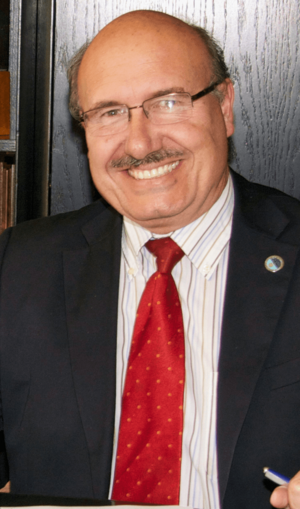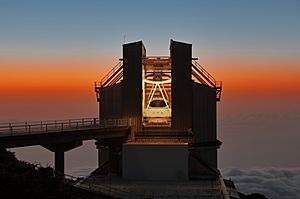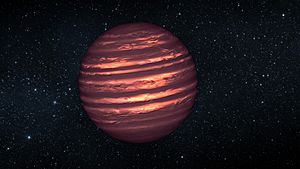Rafael Rebolo López facts for kids
Rafael Rebolo López was born on September 12, 1961, in Cartagena, Spain. He is a Spanish astrophysicist, which means he studies space and the universe. In October 2013, he became the director of the Instituto de Astrofísica de Canarias (IAC). This is a very important research center for astronomy. He is also a professor at the Spanish National Research Council. In 2002, Rebolo became a professor at the Max Planck Institute for Astronomy in Germany. He also joined the Max Planck Society, a group of top scientists.
Contents
Education and Early Career
Rafael Rebolo studied physics at the University of Granada. He earned his degree in 1984. After that, he continued his studies in astrophysics. He received his doctorate degree from the University of La Laguna in 1987.
Starting His Research Journey
In 1984, Rafael Rebolo began his career as a researcher. He joined the Institute of Astrophysics of the Canary Islands (IAC). From 1997 to 1999, he was the head of the IAC Research Division. In 1998, he became a professor of Physical Science at the Spanish National Research Council (CSIC).
International Recognition
In 2002, Rebolo became a member of the Max Planck Society. He also became an external professor at the Max Planck Institute for Astronomy in Heidelberg, Germany. This shows his important role in the world of astronomy.
Discoveries and Research
Rafael Rebolo has led many exciting research projects. His work focuses on cosmology, which is the study of the universe's origin and future. He also studies stellar physics, which is about stars, and exoplanets, which are planets outside our solar system.
Exploring the Universe's Secrets
Rebolo's research includes studying the cosmic microwave background. This is like an echo from the Big Bang, the beginning of the universe. He also studies objects that are between stars and planets, called sub-stellar objects. His work also involves looking for black holes and searching for exoplanets that might be similar to Earth.
Key Discoveries
In 1995, Rafael Rebolo and his team made a big discovery. They found the first brown dwarfs. These are objects that are bigger than giant planets but smaller than stars. In 2000, he was part of the team that discovered several giant extrasolar planets. These are planets orbiting other stars.
Rebolo also provided proof in 1999 that supernovae (exploding stars) are connected to black holes. He was one of the first in Spain to do experiments on the cosmic microwave background. He has worked with universities like Manchester and Cambridge on observation experiments at the Observatorio del Teide.
Leading Major Projects
Rebolo leads the QUIJOTE consortium. This group uses telescopes in Tenerife to measure the polarization of the cosmic microwave background. He is also a co-director for the ESPRESSO spectrograph. This tool helps find Earth-like planets using the 8-meter Very Large Telescope (VLT) in Chile.
He is also involved in the AOLI project. This project uses the 4.2-meter William Herschel Telescope at the Roque de los Muchachos Observatory in La Palma, Canary Islands to take very detailed images. Rebolo is also a co-investigator for the European Space Agency's Planck and Euclid space missions. He is a member of the board for the 10.4-meter Gran Telescopio Canarias (GTC) and the Cherenkov Telescope Array. Since 2011, he has been the Scientific Director of the "IAC: Severo Ochoa Centre of Excellence" program.
Awards and Honors
Rafael Rebolo has received many awards for his important work. He is a member of the Royal Academy of Exact, Physical and Natural Sciences of Spain. He is also an Academician of the Academy of Science and Engineering Lanzarote. The Polytechnic University of Cartagena has given him an honorary doctorate degree.
Some of his notable awards include:
- Iberdrola Prize of Science and Technology (2000)
- Jaime I Research Prize (2001)
- Canary Islands Prize for Research (2002)
- Medal of Honor for the Promotion of the Invention (2004)
- Jules Janssen Prize of the French Astronomical Society (2015)
- Premio Nacional de Investigación Blas Cabrera (2018)
See also
 In Spanish: Rafael Rebolo López para niños
In Spanish: Rafael Rebolo López para niños
 | Sharif Bey |
 | Hale Woodruff |
 | Richmond Barthé |
 | Purvis Young |




